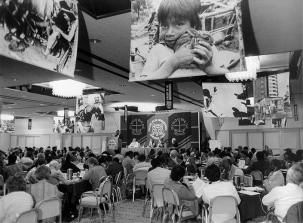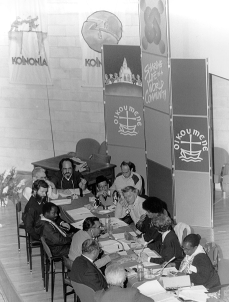![]() from
inter-church aid to jubilee: a brief history of ecumenical diakonia in
the wcc Acrobat®
pdf-file (112KB)
from
inter-church aid to jubilee: a brief history of ecumenical diakonia in
the wcc Acrobat®
pdf-file (112KB)
The work of the Diakonia & Solidarity team is rooted in the history and experiences of the WCC as it has exercised its diaconal ministry (Christian service) and solidarity with the marginalized and excluded. It builds on ecumenical consultations in Larnaca (1986) and El Escorial (1987), and continues the work of the former Unit IV - Sharing and Service.
At the Larnaca 1986 world consultation on Diakonia 2000: Called to be neighbours, the churches recognized the need for a more comprehensive, holistic and liberating diaconia aimed at transformation at all levels, taking into account other, sometimes less obvious, forms of aid than the purely material kind. This was the outcome of a process which started in Uppsala in 1968 when churches started to move beyond a narrow paternalistic approach to development to a wider view that challenged the status quo. Debates throughout the 1970s about justice and service issues, and disillusionment with "development" due to the burgeoning debt crisis during the 1980s were part of that process. Larnaca did not talk about solutions. Instead, it spoke of a journey.

Larnaca,
Cyprus, 1986

El Escorial, Spain,
1999
The following year, another WCC world consultation in El Escorial, on Koinonia: Sharing life in a world community, focused on ecumenical resource-sharing. Guidelines for an "ecumenical discipline", based on a fundamentally new value system, were drawn up for the sharing of resources: equal partnership; exposing and challenging the root causes and structures of injustice; enabling people to realise their potentials; promoting and strengthening the holistic mission of the church and ecumenical sharing; overcoming all barriers between different faiths and ideologies; and facilitating dialogue and participation.
Power and empowerment were key concepts at the WCC Seventh Assembly in Canberra, Australia, in 1991. It was clear that the injustices of the world are not the result of a lack of resources. It is the unfair distribution of those resources that is the problem. Capacity-building and community empowerment to rediscover and develop people's own potential and resources, and to preserve their dignity and right to determine their own destiny became central to the work of Sharing and Service.
"Jubilee" is mentioned in the Book of Leviticus, chapter 25. The jubilee year as the "year of restoration" was to come every 50 years. Freedom would be proclaimed to all the inhabitants of the land. Debt would be cancelled. Property would be returned to its former owners. Slaves would be set free. The land would be allowed to rest for a year.
A "Strategy for Jubilee" was adopted at the Sharing and Service Commission meeting in Alexandria in 1995. The plan, to cover the years from 1995 to1998, sought to apply the principles of the biblical jubilee to the contemporary world. It identified five groups of "jubilee peoples" as targets for practical actions of solidarity: children, marginalized and excluded women, economically and politically marginalized people, uprooted people, and people living in the midst of conflict and disaster.
Beyond the Eighth Assembly in Harare, Zimbabwe, in 1998 and within the new WCC vision and structure, the Diakonia & Solidarity team worked on the above principles, learnings and experiences in order to address the challenges of the changing world context. It continues to be challenged to envision new and creative mechanisms for sharing, mutual accountability, advocacy, solidarity and just relationships.
| |
|
|
|
|
|
|
|
|
